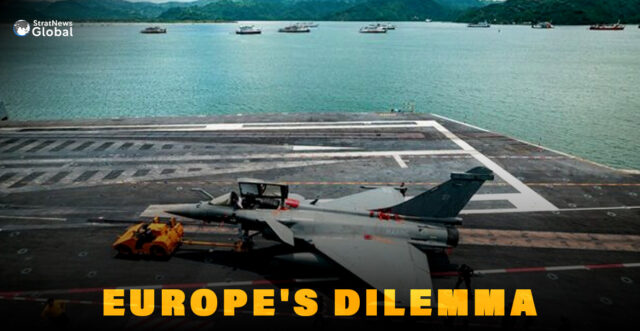In a world grappling with a second Trump presidency, Europe’s defence posture in the Indo-Pacific is under renewed scrutiny. The June 2025 report by the International Institute for Strategic Studies (IISS), More or Less? European Defence Engagement in the Indo-Pacific in the Second Trump Administration, underscores the complex balancing act European powers now face: recalibrating their strategic compass amid a waning U.S. security umbrella, a protracted war in Ukraine, and the growing shadow of China’s assertiveness.
Strategic Convergence, Tactical Divergence
Authored by Ben Schreer, Executive Director, IISS-Europe and Director, Defence, Technology and Future Conflict, The IISS report identifies a strategic shift already underway. European capitals now increasingly acknowledge the Indo-Pacific as no longer a distant theatre. China’s growing reach into the Arctic, its suspected involvement in hybrid warfare (including undersea cable sabotage), and its overt alignment with Russia have eroded the traditional geographic and psychological distance Europeans maintained from Asia’s security dilemmas.
Yet while the recognition of Indo-Pacific relevance is real, the report makes clear that a meaningful shift in military posture remains constrained. The war in Ukraine has stretched European defence budgets and capacities thin, and Trump’s America is pushing Europe to focus inward, on self-defence, rather than participate in far-flung contests.
The Trump Effect: Strategic Autonomy, or Strategic Confusion?
One of the more striking insights from the IISS report is how Trump’s second term is catalysing both introspection and ambition within Europe. With Washington appearing disinterested in underwriting European security, the logic might dictate a pullback from Indo-Pacific engagements. Instead, paradoxically, the opposite may happen.
European powers—especially France, Germany, and Italy—may deepen their defence-industrial and strategic ties with Indo-Pacific partners because of Trump. As the report notes, these relationships offer a way to hedge against both Chinese coercion and U.S. unreliability. The EU’s growing willingness to open defence contracts to Asian partners and to forge industrial links with Japan, India, and South Korea points to a more autonomous strategic path.
France and Germany: Leading the Continental Response
France stands out for its persistent and principled engagement. As a resident power in the Indo-Pacific, with territories and citizens scattered across the region, Paris has strong incentives to maintain a robust presence. Its Clemenceau 25 mission, involving the aircraft carrier Charles de Gaulle, was emblematic of this intent: not merely signalling to Beijing, but reaffirming commitments to regional partners such as Indonesia and the Philippines.
Germany, once cautious to the point of passivity, has shifted dramatically. The deployment of two warships through the Taiwan Strait in 2024 and joint air exercises with Japan and India highlight a more assertive approach. The Merz government’s latest coalition agreement reaffirms this direction, coupling strategic signalling with industrial cooperation and trade diversification—albeit still hindered by lingering commercial dependencies on China.
Constraints of Capacity, Not Will
Still, the IISS report cautions against overestimating Europe’s appetite or ability to project force in the Indo-Pacific. Most deployments are short-term, symbolic, or commercially motivated. With NATO’s Euro-Atlantic demands intensifying, the idea of a permanent European military presence in Asia remains far-fetched.
Moreover, the report reveals an uncomfortable truth: European publics do not perceive China as a military threat. This gap between elite perception and popular will is likely to act as a brake on any significant military escalation, especially in the event of a Taiwan contingency.
The Real Pivot: From Boots to Blueprints
Where Europe might truly make a mark is not through gunboat diplomacy but through the spread of defence-industrial ecosystems. As Indo-Pacific states look to diversify from U.S. or Russian arms dependence, European manufacturers—from France’s Dassault to Italy’s Fincantieri—are eyeing lucrative opportunities.
More importantly, this industrial footprint also fosters strategic entanglement. Shared projects, co-production, and technology transfers can build long-term alignment that survives political churn—on both sides of the Eurasian landmass.
Conclusion: Neither Retreat Nor Advance, But Realignment
Europe’s Indo-Pacific engagement, as detailed in the IISS report, is not a story of military expansion or strategic retreat. It is a recalibration driven by necessity, opportunity, and anxiety. As the U.S. signals unpredictability,and China pushes its authoritarian agenda, Europe is being nudged—often reluctantly—toward greater responsibility on the global stage.
Whether that translates into sustained presence or simply strategic posturing remains to be seen. But one thing is clear: the Indo-Pacific is no longer someone else’s problem. For Europe, it is a frontier where credibility, commerce, and contingency now meet.
In a career spanning three decades and counting, Ramananda (Ram to his friends) has been the foreign editor of The Telegraph, Outlook Magazine and the New Indian Express. He helped set up rediff.com’s editorial operations in San Jose and New York, helmed sify.com, and was the founder editor of India.com.
His work has featured in national and international publications like the Al Jazeera Centre for Studies, Global Times and Ashahi Shimbun. But his one constant over all these years, he says, has been the attempt to understand rising India’s place in the world.
He can rustle up a mean salad, his oil-less pepper chicken is to die for, and all it takes is some beer and rhythm and blues to rock his soul.
Talk to him about foreign and strategic affairs, media, South Asia, China, and of course India.





